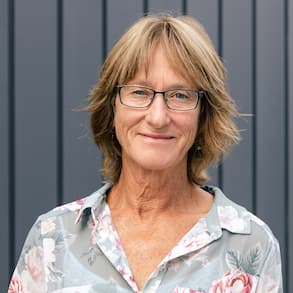Midwifery ‘best job in the world’

Debbie Fisher is now New Zealand College of Midwives’ co-president. Photo: Anne Hardie.
Debbie Fisher says being a midwife is the best job in the world and she is now looking after the interests of midwives throughout the country as co-president for the New Zealand College of Midwives.
A big part of the Richmond-based midwife’s new role is enticing more people to choose midwifery as a career because there continues to be a shortage.
In Nelson Tasman there are about 1,000 births each year and she says it is still almost five full-time equivalent midwives short and each midwife, either in the hospital or community, usually cares for 50 women.
Her own career began with nursing at what was then Nelson Polytech, before heading to Brisbane where she trained in midwifery and worked in a hospital that delivered 9,000 babies each year.
Further down the track she worked in London, managing a team that cared for vulnerable women who were struggling for care through their pregnancy and/or with a baby, such as teenage pregnancies, women in prison, women with drug addictions and refugees.
“It was very diverse and rewarding. Nothing phases me now.”
She became a lactation consultant, and then her interest in health services led to her role as operations manager for maternity services in the Top of the South and now the addition of the national role of co-president.
Her own career path to management is just one of the directions people can choose in midwifery and she says a career can also head into education, research, or clinical coaching.
In the past decade, she says there have been some incredible changes in testing, screening and scanning that give midwives valuable information they did not have, particularly health conditions in pregnancies and births.
“What we see is a significant decline in stillbirths and neonatal deaths because of the testing.”
At the same time, midwives now see more older mums, more obesity and rising caesarean rates.
She says a significant number of pregnant women in the Nelson-Tasman area do not have a place to live, with some struggling to get to appointments. She estimates a 100 or more pregnant women they deal with each year face housing challenges with their newborn babies.
“We have quite a few in temporary accommodation and some living in cars or camping grounds. Our midwives are spending a lot of time in that social welfare space.”
Between today’s technology and changes in society, Debbie says midwives have a more diverse career than ever before and that requires a multitude of skills.
“I’m always incredibly proud of the skillset in midwives today. It’s the best job in the world, I think. To be with people at the most joyous time of their life is the most amazing experience.”
